Most drivers prefer plugging in at home or nearby, especially overnight. While this offers convenience, it creates problems for the power grid, which is already under stress during peak evening hours.
Wildly misleading title. Overnight charging doesn’t pose a problem, charging in the evening may pose a problem. All EVs today have scheduled charging so you can plug it in when you get home but it won’t charge until nighttime where load and price are low. This is a non-issue, it has already been solved for everyone but the most dense idiot consumers.
it has already been solved for everyone but the most dense idiot consumers.
So we’re doomed then
You’re missing that the researchers recommend charging during daytime business hours, which means people who use EVs to drive to work would need public or workplace provided chargers to accommodate this.
Setting a timer to charge around noon wouldn’t help if you’re parked at your job with no chargers nearby.
You just need to avoid peak evening hours to avoid overloading the grid, and a timer set to start at 1am solves this perfectly fine.
Depending on where you live, night time is also lowest load on the grid.
I’m not sure you’re talking about the same thing the paper is about. The overall load is lower, but the mix of power types is different.
Specifically, in California, there’s a HUGE difference in power generation types overnight than during the day. There’s excess capacity until the sun goes down due to solar. If you look ahead to everyone driving EVs, and then assume that everyone charges at night, then the power problem is completely different than what it is today.
You obviously missed the context entirely.
The study the article is talking about, is a possible solution to cover California’s solar energy glut problem during the day, because the state doesn’t have enough batteries. It is a case study. In trying to do that, it may create other problems, such as infrastructure to get people to charge their cars during the day while they work. This means employers must pay or get somebody to pay for chargers at the work place, adding onto more costs onto the employee and/or employer. Nighttime charging may be cheaper and more convenient, but remember, the study wants you to capture all the wonder solar power during the day, not use potential green house gases from natural gas at night. The more complexity, the more problems you have.



